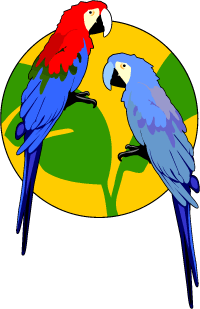Avian Influenza (AKA Bird 'Flu)
Created | Updated Nov 10, 2005

Global threat
Reports of bird 'flu among poultry in Russia and Kazakhstan in July 2005 have raised fears of a pandemic, and the World Health Organization is urging heightened surveillance and vigilance. Scientists fear a global epidemic of deadly 'flu in humans will strike soon, as this tends to happen three or four times a century.
Bird flu is the most likely trigger and one virus that causes it - H5N1 - is giving particular cause for alarm.
What is avian influenza (bird 'flu)?
Bird flu is an infection caused by avian (bird) influenza (flu) viruses. These flu viruses occur naturally among birds. Wild birds worldwide carry the viruses in their intestines, but usually do not get sick from them. However, bird flu is very contagious among birds and can make some domesticated birds, including chickens, ducks, and turkeys, very sick and kill them.
How does bird flu spread?
Infected birds pass out 'flu virus in their saliva, nasal secretions, and faeces. Susceptible birds become infected when they have contact with contaminated excretions or surfaces that are exposed to excretions.
Do bird 'flu viruses infect humans?
Bird flu viruses do not usually infect humans, but several cases of human infection with bird flu viruses have occurred since 1997. The virus has also killed dozens of people since re-emerging in SE Asia in 2003. The WHO says poultry outbreaks in some areas have been successfully contained, and most human outbreaks have been traced to direct contact with diseased or dead poultry. Experts think it is only a matter of time before the virus changes and develops the ability to spread easily among humans.
Each additional human case increases opportunities for the virus to improve its transmissibility, through either adaptive mutation or re-assortment. The emergence of an H5N1 strain that is readily transmitted among humans would mark the start of a pandemic.
The World Health Organization
What are the symptoms of bird flu in humans?
The symptoms of bird 'flu may depend on which virus caused the infection. Symptoms in humans have ranged from typical flu-like symptoms (high temp/fever, cough, sore throat and aching muscles) to eye infections, pneumonia, severe respiratory diseases (such as acute respiratory distress), and other life-threatening complications.
How are humans infected and can they be treated?
Possibly most cases of bird 'flu infection in humans have resulted from contact with infected poultry or contaminated excretions or surfaces. Prescription medicines approved for human 'flu viruses would work in preventing bird 'flu infection in humans. However, 'flu viruses can become resistant to these drugs, so these medications may not always work. There is no treatment for preventing becoming infected by new, mutant 'flu viruses.
Reduce the risks
People should avoid contact with infected birds and suspected contaminated surfaces, and should be extra careful to observe hygiene rules when handling and cooking poultry. For more information about Avian influenza and food safety issues, visit the World Health Organization website.
